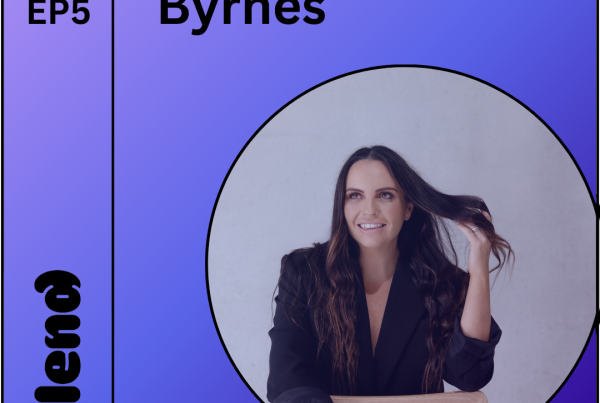
In this episode we’ll be discussing a revolutionary app that has been designed to assist co-parents in communicating and organising for the benefit of their children; 2Houses.
The app was created to help make co-parenting easier and more efficient by providing a platform for parents to communicate, coordinate schedules, and share vital information.
We’ll hear from the founder of the app, Gill Ruidant, who will share his experience and insights on how the app is helping co-parents navigate this challenging journey, and ensure the wellbeing of their children.
Gill Ruidant (00:00): I had two options. Option one, continue to develop in the lab, option two, continue to develop within the market, collecting feedback from our users to ensure we have an app that is aligned with the divorced parents’ needs. That’s not an easy journey, but that’s the only way to bring a solution to a pain point.
Laura Jenkins (00:20): In The Blend is a podcast series that helps parents navigate life within a blended family. Join me as I speak with experts and guests to get practical advice on how to have a harmonious blended family life. This series dives deep into the unique dynamics, logistics and challenges of raising a blended family. From new partners to juggling mixed finances, we will help guide you through it.
(00:48): Hello and welcome to In The Blend. In today’s episode, we will be discussing a revolutionary app that has been designed to assist co-parents in communicating and organizing for the benefit of their children. As you will likely know, co-parenting can be a challenging journey, particularly when communication is difficult and schedules are complicated.
(01:11): The 2houses app was created to help make co-parenting easier and more efficient by providing a platform for parents to communicate, coordinate schedules, and share vital information. Our guest today is the founder of the app, Giles Ruidant, who will share his experience and insights on how the app is helping co-parents navigate this challenging journey and ensure the wellbeing of their children. So if you are a co-parent, or you know someone who is, this is an episode you won’t want to miss.
(01:45): Well, good evening and thank you so much for joining me today, on In The Blend. I am delighted to be having our first ever guest from Europe. We have a Belgium-based guest with us today who is the co-founder of 2houses, a co-parenting app. I have got so many questions I would love to fire off at you. But look, to start us off today, can you tell us a little bit about your background and what inspired you to create an app for co-parents?
Gill Ruidant (02:18): Sure. Actually, when I got divorced a few years ago now, yeah, 15 years ago, I quickly noticed that phone and direct conversations were generating conflicts. We were looking, my ex-wife and I, for a tool which will be a go-between and facilitate the communication and general organization in a neutral environment, in the interest of our son.
(02:54): We couldn’t really find a solution that suited us, at that time. We tried a few things online, a shared calendar, a to-do list, to share certain things we had to do, to make sure everything was okay for our son, but we couldn’t find any solution for the finance part. And at the end, multiple different tools, and no integrated solutions. To make a long story short, it didn’t work for us.
(03:28): I was working for an American technology company at that time. Actually this company took over my previous startup, and I was integrated in the group as an operation manager for Europe and Middle East, so very busy, traveling a lot at that time.
(03:45): A few years later, again, my ex-wife and I were still, I mean, struggling, and I decided to dig a little bit more in a solution for divorced and separated parents. I asked to myself, “What would be the top three features for an online solution that would help us in the communication and organization for our son, as divorced parents?” And then I’ve done a survey to friends and family. Then bigger survey organized by an external company to understand better the pain point, and not only mine. And I started to build a requirement book for an online platform. It was back in 2011.
(04:33): And then I entered an incubator, a program called The Founder Institute, and I’ve built the very first version of my solution in four months. That was a crazy time. Of course, it was even less than the MVP, the minimal viable product. It’s a very simple thing, but enough to give it a try, to divorced and separated parents around me. So end of 2011, version zero of 2houses was out, ready to test for the users, and give feedback.
Laura Jenkins (05:11): I love it. I love it. I love how you were propelled by your own personal experience and combining that with your corporate or professional experience as well and merging the two together. Look, I’d love to know. How does your app help co-parents communicate effectively for the benefit of their children and overcome some of the challenges that you were encountering with some of the standard communication platforms?
Gill Ruidant (05:41): It removes the negative part of the emotion to go for a better communication. For example, and we may come back on the features in more details later, but if I want to have my son with me the next weekend, and he’s normally with his mom, I can very easily, through an intuitive interface, move these two days to me, and my ex-wife will receive a pre-formatted notification so it’s not me typing the message with my emotion. And she will be able to accept, reject, or propose an alternative.
(06:20): Also, our solution gives the chance to the co-parents to build the organization based on an asynchronous communication, so less space for the conflicts. The other thing, it prevents the kids to be the messengers and carry the communication book in their school bag, if you see what I mean? Yeah.
(06:50): Last bit, at least it allows the parents to access the same information. Very simple, but in place of having one parent managing the calendar on an Excel sheet, the other parent having a printed calendar stick on the fridge, and of course, 2houses being a digital system, it gives the chance to the parents to keep track of the information and be able to come back on some data when they need. They can also export the information, if it has to be used outside of the platform.
Laura Jenkins (07:24): Wow. I love that. It can minimise error by them both having access to the exact same information. What really jumped out at me from what you just described was the ability for that notification to instantly go to the other parent, saving you from having to type something that might be emotionally fueled via a text message or an email, and it keeps it very black and white.
Gill Ruidant (07:50): Yeah.
Laura Jenkins (07:51): Yeah, it’s something that I wish we’d known about much, much earlier on. Let’s talk about some of the features and the major benefits, then, that it offers families, that might set it apart from some of the other tools that are on the market, at the moment. Can you talk us through some of those?
Gill Ruidant (08:12): Yeah, sure. Sure. Yeah, let’s start by the calendar. So 2houses offers an interactive, shared calendar with many opportunities for sharing and synchronization, which is needed, obviously, for modern family. The parents can set their standard parenting schedules based on some pre-formatted templates in line with the agreement, and they can manage, as I explained, changed… changes, sorry, without any time clashes. That’s for the calendar. Also, that’s a calendar with many very specific tools for divorced and separated parents.
(08:58): Then the finance part. We offer a simple and effective financial management system for the parents. For example, you can view reports by specific categories or periods. 2houses manage the shared expenses and displays the balance, to ensure equilibrated and healthy accounts.
(09:23): And then the order is important. A calendar is the most used feature, finance is the second, and then the messages. 2houses offers a simple messaging tool that is efficient and secure, to keep track of all communication, whether with the other parent, but also with one of the children, or even with a mediator, and conversation can be exported or printed out.
(09:50): And then we have the information bank. There, you can find everything about the kids that is stored in there. If you are looking for the tennis coach contact details, or the doctor, or the clothing size, social security number, school documents, et cetera, everything is in there.
(10:12): And then we have, quickly, the journal. Journal is a quick family social network, photo albums, and above all that, of course notifications, push notifications, so email notification. And I forgot to say everything in six languages, so 2houses is available in English, French, Dutch, German, Italian, and Spanish.
Laura Jenkins (10:42): Fantastic. I am extremely impressed, listening to you describe all the different things that this app does. In particular, the fact that it’s secure, and it allows you to store all of those handy pieces of information that you’re often scrambling around looking for. That sounds like it’s been extremely well thought out.
(11:07): Coming back to the security piece, I know this can be quite an important factor for many people who might be considering loading up a lot of their personal data into an app. Can you tell me a little bit about how you ensure that the data and the information that’s shared between the co-parents through the app is secure and confidential?
Gill Ruidant (11:28): Mm-hmm. Mm-hmm. Mm-hmm. Sure. Yeah, of course. Family’s privacy is our priority, so no information is shared with third parties. The data of each parent is only accessible by him or her. And our system is regularly audited to ensure that we offer the best in terms of safety.
(11:51): So each parent has their own security access protected by encrypted password. The private information of each parent, so email address, or credit card information, phone number, is not accessible, obviously, by the other parent. We haven’t talked about that yet, but a parent can decide to give access to the children. There are some rights management there.
(12:21): I can decide, for example, to give access to my son, to the calendar only, in read-only mode, just for example. That is the type of access rights we manage directly in the app. Also, 2houses can be accessed by third parties, grandparents, for example, involved in the family organization. And I said that quickly before, but to mediators as well, in read-only mode, to monitor the account. That’s useful in some situations.
(12:56): So yeah, about security tools, this guarantees that everything is in place to ensure the total confidentiality of the data stored by the parents. We use the latest privacy mechanisms and ensure that the information is secure in the event of an equipment failure or data lost. So our databases’ servers are not accessible from the outside. We use Amazon Virtual Private Cloud for that.
(13:27): Concerning the management of apps’ internal authorizations, we do data partitioning by family, so each request is filtered by an authorization system, that is tested. Yeah, and we also use an external provider to manage updates and privacy at the server application level. And all requests go through, obviously, a firewall. In addition, 2houses use an external auditor who regularly ensures that the system complies with the latest privacy and confidentiality standards.
Laura Jenkins (14:03): Fantastic. It sounds extremely thorough, from what you’ve described. In terms of the children accessing, I just want to go back to that point you made as well, because that was going through my head earlier. Just to ensure that I’ve understood correctly, children could have access to the app. So they would download it, they might have it on their own iPhone, if they’ve got their own phone, but then they’d only be able to see any information that had been granted by the parents. Is that correct? For example, the calendar.
Gill Ruidant (14:35):
That’s correct. Within the app, a parent can send an invite to a child, and only at that moment, the kids will be able to download the app and log into the app. Otherwise, it’s not possible for them to do so.
(14:55): And you’re right. That’s up to the parent to decide and to tick the boxes, “Okay. I’m okay to give, as you said, access to the calendar in read-only mode. And then they are able also to access the journal. And they can also write in the journal.” That’s up to them to decide. Yes.
Laura Jenkins (15:12): Okay. It’s something else I was thinking about, just before we move on, was around the blended family situation as well. In my personal circumstance, I’m a stepmom, and I’m a biological mom as well. So for my stepchildren, who are going back and forth between two houses, I would find it immensely helpful to have access to that shared calendar, as a stepmom, so I can see, “Oh, yes. We’ve got soccer practice this afternoon, or gymnastics on Saturday morning,” and not have to rely on my partner or the ex to communicate that information with me. It just makes it much easier, I can imagine, from a logistics perspective as well. So assuming-
Gill Ruidant (15:55): Yes.
Laura Jenkins (15:55):
… co-parents can have access to the app, anyone you grant access could have access to that instance. Is that correct?
Gill Ruidant (16:02): Yes. Yes.
Laura Jenkins (16:03): Fantastic.
Gill Ruidant (16:03): That’s in the third-party sections I was mentioning before.
Gill Ruidant (16:08): Yes.
Gill Ruidant (16:09): I can grant access to, yes, another person, a-
Laura Jenkins (16:11): Yes.
Gill Ruidant (16:17): … stepmum, for example. What you can do, you can switch families. Sorry for the term. That’s a feature in 2houses. You can have your family, and then the other family. So you can manage and synchronize the calendar with your everyday calendar, so you can see everything in there.
Laura Jenkins (16:36):
Oh, I love that. You’re saying I could have my two children and the calendar of activities relating to them, and then-
Gill Ruidant (16:45): Yes.
Laura Jenkins (16:46): .. access to my stepchildren’s calendar, which is co-shared with their mom, and access to that all in one spot.
Gill Ruidant (16:54): Yes. Correct.
Laura Jenkins (16:56): I love it. Very good. Moving on, I am curious to understand what feedback has been like from users. This is something that I’ve only discovered recently. I’d love to know what the reaction has been to this because it sounds like something that would be immensely helpful to people in a variety of circumstances. I’d love to hear whether there might be some success stories that you can share from users who’ve had a good experience with the app.
Gill Ruidant (17:27): Mm-hmm. Mm-hmm. Yeah, feedback from our users, so important. I think I can objectively say that 2houses, I mean the product, has been by the users, has been developed by the users. This was really a priority since the very beginning.
(17:49): I’ve talked about that before, but when I started with the very first version of the product, I had two options, option one, continue to develop in the lab, yeah, option two, continue to develop within the market, collecting feedback from our users to ensure we have an app that is aligned with the divorced parents’ needs. That’s not an easy journey, by the way, full of decision to make, based on prioritisation, but that’s the only way to bring a solution to a pain point.
(18:31): We have many stories. Actually, we have two types of users, the ones that have still a good communication between them, who need a tool to help them in the daily organization and communication and keep track of the information. They still communicate and in good terms. But we also have some users from whom… for whom, sorry, 2houses is the only way of communication. We have seen that in user feedback. I think we all have hoped this would never happen, but we are very happy to bring this tool, to allow them to have another kind of communication, in the direct interest of the kids.
(19:27): I also have in mind some user stories, and family is using 2houses to manage the organisation about the dog-
Laura Jenkins (19:36): Ah.
Gill Ruidant (19:36): … after a divorce. That was quite funny. We have some there. Other than that many, many stories we have. We have a few feedbacks in front of me. I brought a big list, but I can go through few, if you want.
Laura Jenkins (19:54): Yes.
Gill Ruidant (19:57): I will not say any name, but I’m just reading the feedback from our internal system. “Hello. My favorite thing about 2houses is that the site keeps an unchangeable record of all communication between co-parents.” Unchangeable record, it is important.
(20:17): Another one, “I like the calendar so far, sorry. I haven’t had to remind or be asked about an event.” We said that before. Very simple but so important.
(20:30): Another one, “I’ve been with my wife since I was 16. I feel like this is helping organize my thoughts, feelings, reactions, and communication with my wife at this time.” Let’s go to another one. “I love this app, and I feel it does a great job breaking topics and various goals to plan as family, during difficult times. Last one, “Having all communication in one place, also having strands of conversation, is useful. Thank you.” That’s the kind of feedback we receive, positive feedback.
Laura Jenkins (21:13): Fantastic.
Gill Ruidant (21:15): Even if it’s a very sensitive subject, but it’s nice to read.
Laura Jenkins (21:22): And that feedback, I imagine, would help in terms of evolution of the app as well, and making refinements over the years since you’ve launched.
Gill Ruidant (21:34): Oh, yes. Oh, yes. A lot. A lot. Yeah, yeah, yeah. And we are working on different things there, by the way, a new feature based on user feedback, 100%. It’s Invica, the current version. This is the video call feature. Video calls can be done within the app, directly, and it can be recorded.
(22:06): Something I would like to say, and I think it’s important, that’s what our users like, having a one-stop shop, if I can say that, where they can manage all the communication and organisation for the wellbeing of their kids. They don’t want to mix that in other everyday messaging system or application, we all know. They want to be in a closed and secured environment, where they can find everything about the kids. They know when they go in 2houses, that’s everything about the kids. And the tone is also different than using WhatsApp, just to mention one.
Laura Jenkins (22:46): Absolutely.
Gill Ruidant (22:47): Yeah.
Laura Jenkins (22:49): I think there’s so much merit in that. It’s the whole idea of compartmentalizing that part of your life into one tool, rather than having it here, there, and everywhere. Also, huge benefits from the logistics and coordination perspective as well, and organization, not having to go rummaging around for things all over the place as well.
Gill Ruidant (23:15): Correct.
Laura Jenkins (23:16): So I’d love to know, with all of this in mind, if you could provide some advice for co-parents who might be struggling to communicate effectively and stay organized, especially during what is naturally a challenging time, if you’re new to a separation, or you’re new to a blended family, and everybody’s adjusting. Is there any advice that you can provide, given your own personal and professional experience in the space?
Gill Ruidant (23:46): Yes. Yes. I would say take a few steps back, my advice, and think about the priorities. Conflicts can be very destructive. Destructive is it? Yeah? Destructive. And when it touches the kids, this can have a huge impact on them, for today, but for tomorrow as well, when they are adults.
(24:18): So my advice is place the happiness of the kids in the middle. Make this your number one priority. Of course, this is already the case, but before acting, before communicating with the ex, think about this, and align your tone based on this.
Laura Jenkins (24:40): Good advice. Good advice. Something else I’d love to ask is the impact that you hope your app will have on co-parents and their children in the long run. So what’s the big vision?
Gill Ruidant (24:55): Reduce conflicts. Reduce conflicts for the wellbeing of the kids. We are convinced that every small things done in this sense will make them adults with a better self-esteem, and make them themselves even more conscious that their own kids have to stay in the middle of their priorities, for a better world.
Laura Jenkins (25:23): Very good. Well, I am going to pass you, in a moment, to share any final tips with us. But before you do, I’ve got one other question I’m keen to explore. That is around the event where one parent might be keen to use the app, but the other parent may not, and whether you had any advice for the parent who does want to transfer everything into use within the app, to help encourage the other parent to jump on board.
Gill Ruidant (25:56): Yeah, that’s a good one. That’s the number one showstopper in the 2houses onboarding. That’s the other parent doesn’t want to use it. They are different things, and it’s very different based on situations.
(26:17): But one thing is, at some point, so I pick up the phone and try to communicate directly. The other thing is try at another moment. Maybe it’s not the right time now. It’s very time sensitive, so maybe it’s not the right time to do it now. Try at another moment.
(26:47): Of course, as I always say, 2houses, it’s not magic. It helps the parents in the daily communication and organization with the real value for the last 10 years. It gives some place for direct conversations for more important subjects that cannot be discussed and solved through screens. Yeah, that’s my advice.
Laura Jenkins (27:12): Very wise words. Thank you.
Gill Ruidant (27:14): Thank you.
Laura Jenkins (27:14): Thank you for sharing that.
Gill Ruidant (27:14): Thank you. Thank you.
Laura Jenkins (27:16): Well, lastly, and I know we’re almost at time here today, so I’d love to know if there’s any final tips that you’d like to share around anyone who might be sitting on the fence about whether using an app to manage their situation is right for them. Are there any final tips, or advice, or words that you’d like to share to someone?
Gill Ruidant (27:37): Yeah. I would say go ahead and try it, well, for a 14-days trial. And you have even a seven-days extra trial when the co-parent is joining. So go ahead and try it. Maybe it works well for you.
Laura Jenkins (27:55): Fabulous. I assume you’ve got training videos, and the like, available to people who might want to get a closer look at how various features work?
Gill Ruidant (28:06): Yes, sure. Be welcome to visit our website. You can sign up on the web, or you can also download the app directly, on the stores.
Laura Jenkins (28:17): Fantastic. I know you’ve also got a blog on your website with a bunch of useful information about all things co-parenting as well.
Gill Ruidant (28:25): Yes. Correct.
Laura Jenkins (28:27): Excellent. Well, before we finish up, where can people go to connect with you personally, or find out more about 2houses and get their hands on the app?
Giles Ruidant (28:37): Yeah. So website is 2houses.com, number two, H-O-U-S-E-S dot com. And on the stores, you can search 2houses, and you will find us.
Laura Jenkins (28:52): Very good. Thank you so much for your time today. I am extremely inspired to go and download it myself, and have a little play. As I said earlier, I wish I’d come across this a few years ago, where we were right in the thick of things with the backwards and forwards. But it sounds like you’ve done an amazing job thinking through a lot of the pain points from firsthand experience, and it sounds like something that is very well catered to the large growing market of people out there, who do have children who live in two houses.
(29:27): Thank you so much for putting your wonderful ideas into action and creating the app and also for your time today. I’ve so enjoyed our chat.
Gill Ruidant (29:36): Thank you very much, Laura. It was a pleasure.
Laura Jenkins (29:38): Thanks for listening to the In The Blend podcast. The show notes for this episode are available at intheblend.com.au. And if you like what you heard, be sure to subscribe, and please rate and review in your podcasting app. You can also follow me on Facebook, Instagram, and LinkedIn.





